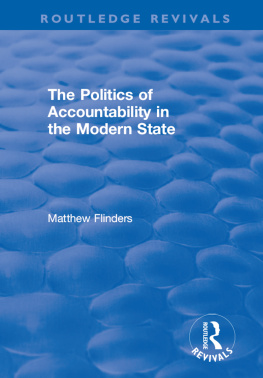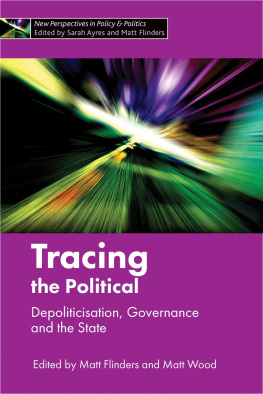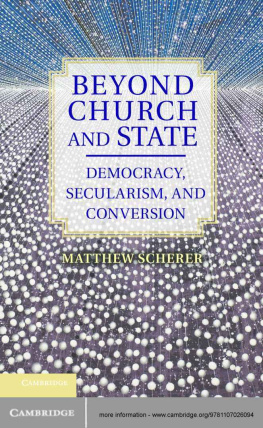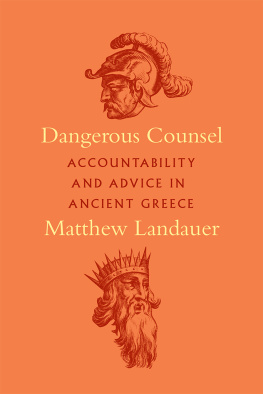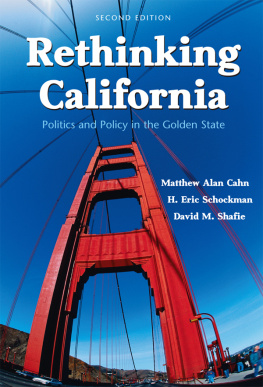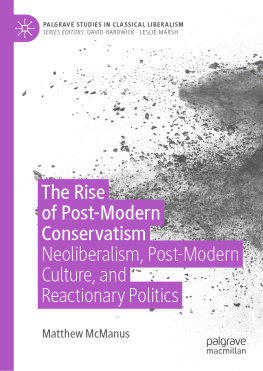THE POLITICS OF ACCOUNTABILITY IN THE MODERN STATE
For Charlie Flinders
The Politics of Accountability in the Modern State
MATTHEW FLINDERS
The University of Sheffield
First published 2001 by Ashgate Publishing
Reissued 2018 by Routledge
2 Park Square, Milton Park, Abingdon, Oxon OX14 4RN
711 Third Avenue, New York, NY 10017, USA
Routledge is an imprint of the Taylor & Francis Group, an informa business
Copyright Matthew Flinders 2001
All rights reserved. No part of this book may be reprinted or reproduced or utilised in any form or by any electronic, mechanical, or other means, now known or hereafter invented, including photocopying and recording, or in any information storage or retrieval system, without permission in writing from the publishers.
Notice:
Product or corporate names may be trademarks or registered trademarks, and are used only for identification and explanation without intent to infringe.
Publishers Note
The publisher has gone to great lengths to ensure the quality of this reprint but points out that some imperfections in the original copies may be apparent.
Disclaimer
The publisher has made every effort to trace copyright holders and welcomes correspondence from those they have been unable to contact.
A Library of Congress record exists under LC control number: 2001093293
ISBN 13: 978-1-138-70288-2 (hbk)
ISBN 13: 978-1-315-20695-0 (ebk)
Contents
This book is my own work. I alone am responsible for its contents. Nevertheless, in completing it I have incurred a great many debts. I would particularly like to thank David Marquand, Ian Harden, Hugh McConnel, Sylvia McColm, Dave Richards, Martin Smith, Sandra van Thiel, Carsten Greve, Andrew Gamble, Tony Payne and Francesca Gains. Much of this research was conducted whilst working on the Economic and Social Research Council funded Whitehall Programme. My thanks and gratitude is therefore extended to a great number of politicians and officials whose thoughts and opinions permeate the course of this book.
Finally, I would like to devote my deepest gratitude to my wife, Tamsin Ryder. There is little doubt this book would not have been completed without her love and support. Thank you.
The book examines: To what degree alternative forms of accountability have evolved to remedy the shortcomings commonly identified with ministerial responsibility to Parliament. It explores the accountability of the core executive and adopts a pluralistic perspective in an attempt to question the continuing centrality of ministerial responsibility to Parliament as the linchpin of the British constitution. The book concludes that alternative forms of accountability have not evolved to the point where they remedy the deficiencies associated with ministerial responsibility. Conversely, it is argued that, to some degree, these new mechanisms have undermined and complicated parliamentary accountability. The increasingly fragmented state has not in itself hollowed out the convention of ministerial responsibility to Parliament but markedly has exposed tensions that have always existed. Ministers have restricted their own spheres of responsibility while placing officials in an invidious position. The reformulation of ministerial responsibility is incompatible with the role and position of officials within the Westminster model. (The latter, it is suggested, creates an accountability gap.) Whether this gap has been plugged successfully by other accountability mechanisms is the topic of this book.
To examine this issue the study adopts a cross-comparative framework which is applied to a single case study. The cross-comparative framework provides an organising perspective based upon three distinct models of accountability (parliamentary, judicial and managerial). The research acknowledges the existence of a range of processes which frequently compel the core executive to release information and account for actions and/or decisions, to the media for example. However, it is argued that these three models can be isolated as they provide formal, coherent and observable processes which could be subject to reform. Moreover, the three models facilitate a coherent methodological agenda whilst also maintaining the scope of the research within realistic boundaries. The study adopts a single case study as its primary tool of analysis. Critics have suggested that case studies are a soft form of research, and in particular that single case studies offer a poor basis for generalisations. Only recently has the value of case study analysis been emphasised. As Rhodes stressed: It is possible to generalise based on a single case study the heuristic case method if the case study sets out to test a theoretical proposition. The single case study is an appropriate design under several circumstances. Overall, the single-case study design is eminently justifiable under certain conditions where the case represents a critical test of existing theory, where the case is a rare or unique event or where the case serves a revelatory purpose. It is argued that the Home Office represents a critical case, a unique case and a revelatory case.
The acknowledgement of a plurality of forms of accountability suggests the mechanisms are complex. Some forms of accountability contractual and market models, for example have been established by the core executive while other forms judicial and quasi-judicial, for example have been imposed externally. The British constitution is built, however precariously, on the political accountability of ministers to Parliament. The structure of the state and the responsibility of the core executive are inherently linked, but as the state diversifies away from the orthodox model of the ministerial department, the convention of ministerial responsibility appears increasingly untenable. In this environment the constitutional elasticity of the convention has been exploited. But the move from the traditional paradigm of public administration towards a more intricate model of new public management, emphasising networks rather than hierarchies, has clearly exposed the tensions and fault-lines that have always existed in the convention. In this context, both constitutional conservatives and reformers have emphasised the role of alternative mechanisms of accountability. The former have intended to undermine the need to introduce reforms and the latter to emphasise what alternative forms of accountability might be developed.
The adoption of a diversified approach offers a number of benefits. Examining the wider picture will allow the issue of political accountability to be located within broader discussions of public accountability. It will also highlight the interconnected nature of the British polity, in which reform in one area will inevitably have a (often unintended) consequence for other sections of the constitutional framework. Empirical research will reveal and contribute to the debate the views and opinions of the actors involved in the various processes and mechanisms. A pluralistic perspective also illuminates the fact that models of accountability shape relationships within the state, as well as expectations. Consequently, it could be suggested that certain forms of accountability are more or less compatible with specific areas of the central state.
Chapter One examines the history of ministerial responsibility and its centrality to the British constitution. It covers theoretical and defintional issues and introduces a pluralistic model of alternative methods of accountability. Chapter Two examines the ability of Parliament to ensure accountable government. It highlights the limitations commonly associated with ministerial responsibility and stresses critical trends, or changes in emphasis, that have arguably recast the convention in favour of the executive. Chapter Three explores the operation of parliamentary accountability in relation to the Home Office. It aims to determine to what degree the imperfections identified'in the preceding chapter are present in reality and what factors and issues have been neglected by the wider literature. The evolution, scope and utility of judicial mechanisms of accountability are considered in Chapter Four. Chapter Five investigates the impact and influence of these mechanisms within the Home Office. The development of managerial forms of accountability (audit, charters, performance indicators, contracts, market mechanisms, etc.) are discussed in Chapter Six. A central tenet of the managerial revolution, encapsulated in new public management, has been that managerial and organisational reforms could improve accountability both upwards to ministers and downwards to consumers. This is tested in Chapter Seven in relation to the Home Office. Chapter Eight focuses on freedom of information legislation. It highlights how the imposition of restrictive measures by the executive exposes both the reality of power within the Westminster model and the inverted logic of ministerial responsibility to the derogation of public accountability. Chapter Nine draws together the findings of this research and offers concluding analysis. Key themes of this book include:


